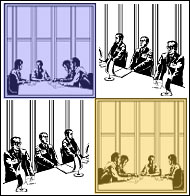
Our meetings last too long! Our meetings are rarely productive, we don't accomplish much! Our meetings are disorganized and disorderly! Our meetings are usually dominated by one or two members!
While a meeting of the board of directors convenes to conduct the business of the association, a separate issue is how well the meeting itself is executed. A board meeting does more than carry out the business of the association - it is also a reflection on how well the business is being managed. A poorly run meeting diminishes the community's confidence in a Board's ability to make sound decisions on behalf of the membership; observers will be left to feel as if the Board is not in control and haphazardly arrives at its decisions.
The above noted complaints about meetings are common, yet easily addressed by employing parliamentary procedures to guide members in a manner that will keep meetings from being both prolonged and/or unproductive. In fact, parliamentary procedures encourage a steady forward direction based on an organized structure that provides a fair hearing for everyone's opinion.
Many avoid using parliamentary procedures because they don't know parliamentary rules. For those who are simply unfamiliar with parliamentary procedure, you can use this snapshot chart. Think about taking copies to your next meeting for fellow board members. Like anything else, once you put it in practice, it will become second nature.
Some suggest that the formality of parliamentary procedures imply a less than friendly feeling, thereby discouraging volunteerism in the community. In reality, parliamentary procedures can actually help your community and its volunteer efforts in ways you may not have considered.
Too often associations have a core group of volunteers who feel they have to be involved in nearly every community aspect and activity because others will not volunteer, or the association has trouble retaining volunteers once they commit. If so, consider the possibility that volunteers (potential or those already serving) may be turned off by the excessive time requirement or lack of productivity of your meetings.

How Can Parliamentary Procedure Help?
Do you stick to the agenda or does conversation stray from one topic to another and from one board member to another without order? Do directors individually repeat at length what has already been stated? Do some members consistently dominate the meeting with their opinions? Do you find yourselves repeatedly deferring issues for another meeting due to time constraints? If so, this is discouraging to members who cannot commit unlimited volunteer time in order to participate.
In contrast parliamentary procedures promote a positive and equal opportunity for an exchange of views by all participants. Order is upheld, for example, when a motion is made to bring an issue forward, requiring a second to proceed. If a second to the motion is not heard, the motion fails presumably because no one beyond the individual making the original motion wished to pursue such a discussion. As a result, discussions do not drift from their original intent. Instead, the Chair rules any unrelated discussion out of order. When a second to the original debatable motion has been made, many boards set time limits (i.e. two minutes) for comment by each member on the specific motion. The Chair will recognize each member in an orderly manner, who then has the floor and may not be interrupted. Instead of being formal, this is simply organized fairness.
Because there may not be a second for motions to discuss a particular topic in which an individual member has an interest, many Boards begin or end their meetings by providing a two-minute period during which each director may address any issue they desire - further providing each director with a reasonable opportunity to speak openly on subjects she/he believes important.
Robert's Rules of Order is considered the written authority on the details of parliamentary procedures, but it is not necessary to be an accomplished user to implement the basic procedures toward a much more efficient and productive meeting today. Try it and see what a difference it will make in your meetings!
Related Articles
- How to Start a Neighborhood Association
- Neighborhood Watch-How to Start One!
- Utilizing a Neighborhood Watch Website
- An Effective Meeting Agenda
- A Guide to Successful Association Meetings
- Association Basics for Committees
- Attracting Volunteers
- Budget Preparation Tips
- Directory of Association Articles
 Print
Print Email
Email







